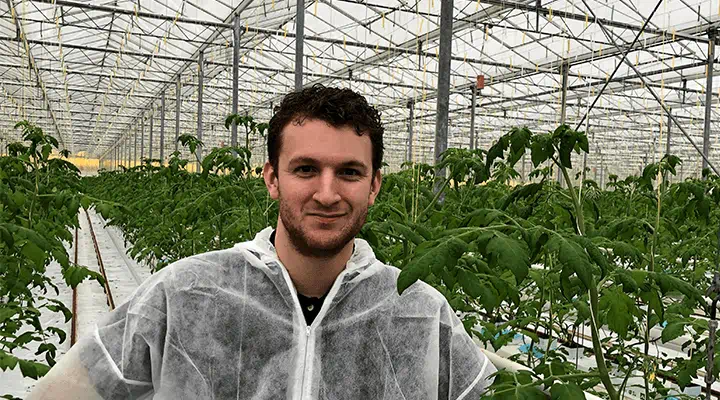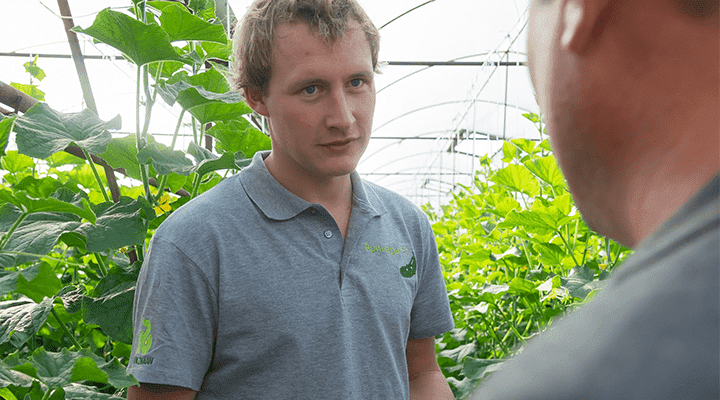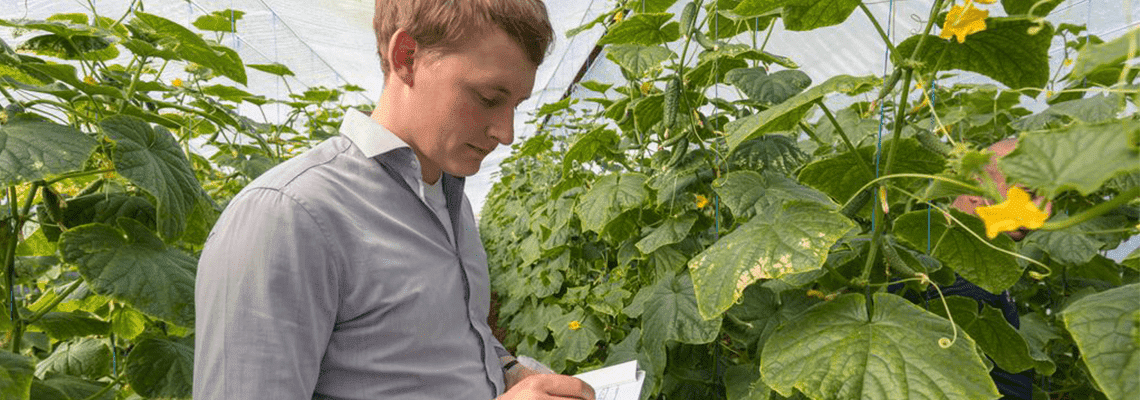Listen to the audio version of this article »
YOUNG PROFESSIONALS MAIKEL (29) AND NICK (24): Finding talent will be a problem in vegetables
Working in horticulture is not self-evident for many young people. Nevertheless, horticulture offers plenty of opportunities to develop yourself and to build a glorious career. For example, in the vegetable sector, where Maikel Hogervorst (Rijk Zwaan) and Nick Noordzij (CombiVliet) have already taken their first successful steps.
Although horticultural companies can rely more and more on data and high-tech technologies, people will continue to be indispensable in the future. After all, the knowledge and insight of real professionals will be needed to control those techniques and to interpret and apply the data. That is exactly why young people are encouraged to study at green and technical universities and to opt for a career in horticulture. Nick Noordzij is 24 years old and has been working at CombiVliet in the Netherlands for four years now as a Cultivation Specialist. CombiVliet is one of the largest tomato growers in Europe and has the ambition to grow considerably in the coming years. By growing CombiVliet will be able to excel in all business processes. Nick first learned about horticulture through family and friends and soon he was caught by the "green virus". ‘It’s a very active sector where a lot is happening, and it offers many great jobs. That is why I started a Horti Technics and Management course seven years ago. Immediately after graduating I was able to start working at CombiVliet’, says Nick.
Anticipate highly on growing conditions
Nick already knew CombiVliet by name and reputation. ‘I heard about the company and I knew how CombiVliet worked and that there were opportunities for employees to grow.’ After he responded to an open vacancy, he started working as a Cultivation Specialist. ‘In that position you are responsible for the tomato variety that is grown at your location. It’s basically my job to manage the greenhouse climate, the water, the heat, the fertilization of the plants and part of the energy management.’ Nick's job has standard and flexible activities. “Standard is setting up the climate computer, assessing the plants in the greenhouse and taking several measurements. Flexible work involves techniques that must be checked and measurements annually. For example, checking the screen package, a growth tube and water delivery. But the great thing about my work is that you must anticipate highly on the outside conditions. Because the weather is different every day, you also have to make different choices every day. By adjusting the growth based on the weather and the plant development, you can get the best out of the plant. This is where my passion lies and where I will continue to meet my challenge every day in the coming years.’

Love for horticulture
Maikel Hogervorst (29) is also passionate about his work. He is a Product Development Specialist at Rijk Zwaan, the fourth largest vegetable breeding company in the world. With subsidiaries in over thirty countries, Rijk Zwaan focuses on the development of new vegetable varieties and selling seeds worldwide. Maikel has been working at the company since 2017, after having completed both a study Horticulture & Agriculture in Delft and a Master Plant Sciences at Wageningen University. ‘My father is a cucumber grower and I have been walking around in greenhouses since I was a child. I did not only work at my father’s company, but also at other nurseries. At first, I did not know if I wanted to continue working in this sector, but during my studies I developed a love of horticulture.’ Maikel was particularly drawn by the international aspect of horticulture. ‘I noticed that many foreign horticultural students see the Netherlands as an example. But some of them had never even been to a greenhouse. That made me realize that we in the Netherlands have a lot of knowledge and experience which we can transfer to entrepreneurs in other countries.’
And that’s what Maikel has been doing since. He first worked for two years as an international agronomist with greenhouse builder Certhon. In that position he assisted foreign entrepreneurs with, among other things, the design of their cultivation, the preparation of a cultivation plan and the settings of their climate computer. ‘As a Product Development Specialist at Rijk Zwaan, I now advise and help growers in Eastern Europe and Russia. I visit trials, introduce new varieties, analyse the markets and try to look ahead to the development of a certain crop or product segment, together with growers and colleagues. But I also welcome visitors to the Netherlands and I am in close contact with colleagues from the foreign branches of Rijk Zwaan. As a result, I am basically a bridge between our head office and the subsidiaries worldwide.

HortiHeroes
Both Nick and Maikel are currently developing themselves rapidly within the vegetable sector. The companies they work at, fully support them in that. ‘At CombiVliet you get every opportunity to further develop yourself through courses, information evenings and, for example, by sharing knowledge with colleagues,’ says Nick. That also applies to Rijk Zwaan, Maikel says. And he also participated in the training program of HortiHeroes, an initiative that prepares young professionals to develop new products, services and business models for their organizations. Challenges such as labour shortage, energy transition and internationalization are turned into opportunities. ‘I have seen and learned a lot in the last five years, which has enabled me to grow enormously. I think personal growth is highly important. Dutch horticulture is at the forefront of the world and can therefore take companies in other countries to a higher level. But if we want to retain our leading role and if we want to keep helping others in the future, it’s important that our own level of knowledge continues to grow.’
Green fingers are not always necessary
In that regard, Nick and Maikel are concerned about the low number of new talents choosing for a career in horticulture. "Too many young people know too little about our sector,’ explains Nick. ‘That’s a shame, because horticulture offers many challenges for the future and there are interesting jobs available in various fields and with good career opportunities. Not only in cultivation, but also in technology, marketing, communication and sales or in the areas of quality, labour, IT and logistics. In many of those functions "Green fingers" are not necessary at all.’ Maikel agrees. ‘But fortunately, there are also young people who are enthusiastic about working in a greenhouse, but the number of horticultural students is dropping quickly. This will certainly require a lot of attention in the coming years. I would be glad to help in any way, wherever I can.’
In addition to finding new talent, Nick sees more opportunities and threats for the vegetable sector. ‘There are opportunities in growing more sustainable and environmentally friendly. For that, we will have to manage energy and water in a more efficient way. But the biggest threat, however, is crop protection. There is a virus in circulation in the sector that can pose a threat now and in the future. All tomato companies try hard to keep the virus out, including us. This is very labour intensive. At the moment there is no solution yet, so working in a hygienic way is a must. We hope that a solution will be found for the future, until then we have to deal with it as best as we can.’
Working high-tech and sustainable
The two young professionals are also ambitious. ‘I would like to continue my current work for many years,’ says Maikel, ‘while expanding my knowledge and experience. And perhaps, in the future, I can grow towards a managing position at Rijk Zwaan. In addition, I want to continue to focus on high-tech oriented countries. My knowledge and passion lie within this field. Moreover, I haven’t learned everything there is to know. So much is happening in horticulture. I regularly visit growers where I can gain a lot of knowledge. In that regard, it is also an interaction between all links in the chain. You have to gain and bring knowledge to be able to climb to a higher level together, so you can provide many people with horticultural products in an even more sustainable way.’
Nick hopes he can make a difference as a cultivation specialist in the coming years. ‘You have to deal with basic principles when growing tomatoes, but you also have to determine your own way of working. How can you, as a person, deal with growing conditions as accurately and effectively as possible? The more critical you are, the better you perform. Implementing your own methods in a good way is what makes you unique. My ambition is and remains to grow the best tomatoes of excellent quality and with the desired taste. I want to continue to develop myself in this area so that I keep getting better in my field. And I already know that in this industry you are never done learning.’






